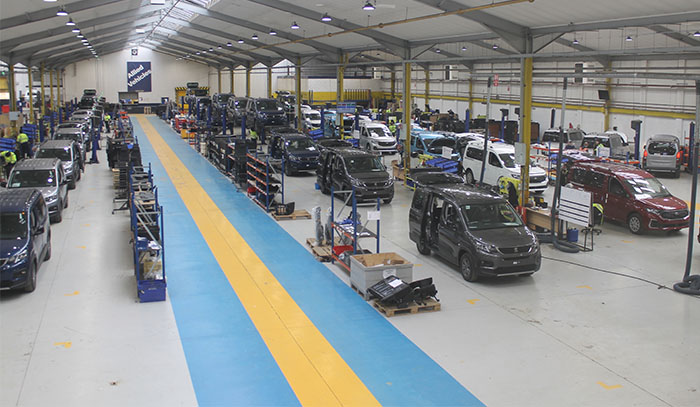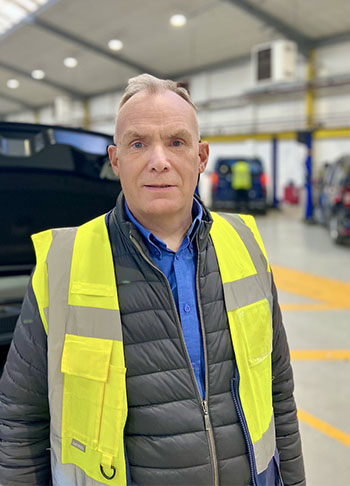 VEHICLE adaptation company Allied Vehicles is boosting production to more than 7,500 vehicles per year and recruiting more staff as it prepares to make inroads into the European market.
VEHICLE adaptation company Allied Vehicles is boosting production to more than 7,500 vehicles per year and recruiting more staff as it prepares to make inroads into the European market.
Allied Vehicles is looking for more than 70 people to join its team in Glasgow, mostly in its pre-production and production areas after two years of a post-Covid famine, exacerbated by global vehicle supply problems and the war in Ukraine.
The family firm, established almost 30 years ago in the city’s Possilpark area, converts a variety of vehicles to make them suitable for wheelchair users, both passengers and drivers.
Operations Director George McAdam, pictured, said the supply problems had been “horrendous”.
“We have seen times where we had no cars whatsoever to build and we’ve also seen times where we were maximising the people we have and actually going out and recruiting,” he said.
“The fact is that Allied and the Facenna family have supported and retained all of the people that we had, knowing that it’s paramount that we have those skill sets, that we look after the staff that have been very loyal to us over the years and we’ve managed to do that.”
During the slump, he said up to 100 staff who had no cars to work on had undertaken other project tasks – painting and generally tidying up the Hawthorn Street site.
“We are now seeing some light at the end of the tunnel, we’re now getting more positive vibes from our suppliers – Peugeot, Volkswagen, Ford, or Citroen – and we’re now seeing vehicles starting to flow in,” said Mr McAdam.
“The plans we have put in place will bring an additional 78 people into the business … and what that does is it allows us over the next nine to 12 months to expand our market share.”
 The ramp-up in production has also involved the creation of a revamped infrastructure at Allied to help the rise in production, including a new £400,000 laser to boost capacity. Processes have been streamlined, and workshop layouts altered to achieve Allied targets. It has also invested “significantly” in training, with more in prospect for the new workers.
The ramp-up in production has also involved the creation of a revamped infrastructure at Allied to help the rise in production, including a new £400,000 laser to boost capacity. Processes have been streamlined, and workshop layouts altered to achieve Allied targets. It has also invested “significantly” in training, with more in prospect for the new workers.
“It’s a large project plan with lots of moving pieces to get there, but we have it within our grasp now and our control to take it forward,” Mr McAdam said, adding that the significance of their announcement could not be underestimated.
“We had less than a day’s worth of cars at times and now, for the first time in about 18 months, we’re getting a week to two weeks’ worth of base vehicles here ready to convert, so we are seeing that flow of material coming in. I have no doubt there’ll be some other bumps along the road as we go through this, but I’d say there’s a lot more confidence in that supply now that we’re seeing it coming in.”
While the vehicle supply issues of the past couple of years may have eased, Mr McAdam remained cautious: “I think from what we’re seeing and hearing, it’s not totally solved, but it is getting a little bit easier.
“Compared to where it was the future’s looking absolutely amazing. I think there’s a lot of pressure on my team, because it’s a big ramp-up, and bringing in more people over a 10 to 12-week period is a massive task … it’s a much more positive set of challenges we’ve got, and something we’re all relishing.”
Peter Facenna, the company’s Managing Director added that expanding into the European market was a key priority for Allied.
“We’ve now successfully built a network of distribution partners across most European countries, and we’re looking forward to increasing production here in Glasgow in order to meet the needs of disabled people – not only in the UK, but across Europe,” he said.
“Most people will probably think we only make things here for Glasgow and Scotland, but we make them for all of the UK and now, most of Western Europe.”

